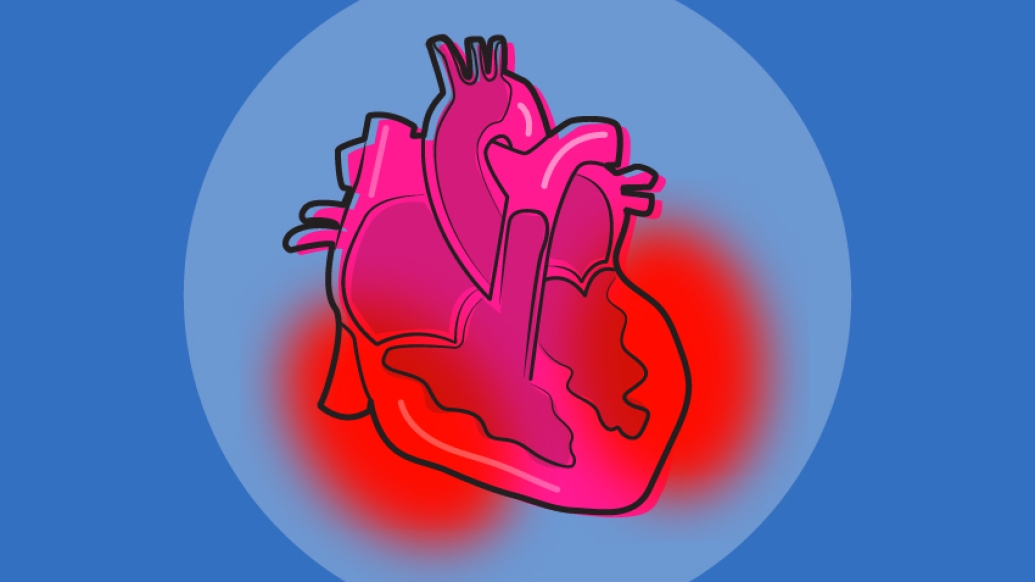With heart inflammation in headlines, a cardiologist explains how inflammation impacts the heart for those concerned, curious or both.
8:57 AM
Author |

These days, you're hearing a lot about inflammation and its negative effects on the body. Most recently, heart inflammation has made headlines as a rare side effect of COVID-19 and the COVID-19 vaccine.
Cardiologist Salim Hayek, M.D., of the University of Michigan Health Frankel Cardiovascular Center answers questions about inflammation of the heart in general, as well as the risks faced by COVID-19 patients and those who have been vaccinated.
What is inflammation?
Hayek: Inflammation is a broad term that describes complex processes in which the body defends itself against what it perceives as foreign invaders, most commonly due to injury or infection. It is a critical part of the body's healing process. However, this normal bodily response can go awry and become dangerous for certain individuals.
SEE ALSO: When a Virus Turns Deadly: What You Should Know About Myocarditis
Inflammation can sometimes lead to auto-immunity — when the immune system turns against the body, leading to such conditions as multiple sclerosis, lupus, erythematosus, rheumatoid arthritis and others. Hyper-inflammation is when the inflammatory response is exaggerated — which is what we see with severe COVID-19 patients. Chronic inflammation is when inflammatory processes persist in the absence of injury or infection, and is a characteristic of many conditions such as diabetes, cancer and heart disease.
How does inflammation affect the heart?
Hayek: We typically classify inflammation of the heart according to its location. There are three types of heart inflammation. Endocarditis is inflammation of the inner lining of the heart and the surface of the heart valves. Myocarditis is inflammation of the heart muscle. Pericarditis is inflammation of the tissue that forms a sac around the heart. Overlap often happens, typically with myocarditis and pericarditis.
What causes an inflamed heart?
Hayek: An inflamed heart can be caused by viral infections such as coxsackie, influenza and SARS-CoV-2, and by bacterial infections like strep and staph. It can also be caused by autoimmune diseases such as lupus and rheumatoid arthritis, a heart attack or heart surgery, certain vaccines and some medications. Smoking is a major cause of chronic inflammation affecting the body's blood vessels, most notably those of the heart.
SEE ALSO: 11 things to know about COVID vaccines and kids' hearts
Anything that triggers the immune response can lead to an abnormal reaction. In the vast majority of people, the body returns to a normal state once the infection is cleared. In some individuals, however, triggering the immune system can lead to an exaggerated and persistent inflammatory response, resulting in myocarditis or injury to other organs. This tends to happen in patients with chronic inflammatory diseases such as diabetes, rheumatoid arthritis and lupus. Although rare, it can also happen in individuals who are otherwise healthy. Unfortunately, we do not have a perfect way to tell who will have an abnormal reaction, but research in the field is moving fast.
How likely is heart inflammation from the COVID vaccine or COVID-19?
Hayek: Vaccines produce a protein that triggers an immune response in the body. With an immune system response, there's a very low risk of developing myocarditis — a type of heart inflammation that tends to be mild and self-resolving. The COVID vaccine in particular very rarely causes a serious autoimmune response. An individual is much more likely to get myocarditis from COVID-19 than from the vaccine due to the stronger immune response triggered by the viral infection. For this reason, getting vaccinated is much less risky than getting infected with regards to myocarditis.
How do I know if my heart is inflamed? What are the symptoms?
Hayek: Some patients have no symptoms at all, while others may experience fever, chest pain, shortness of breath, weight gain, swelling of the arms, legs and abdomen or an irregular heartbeat. We recommend seeking care when symptoms are severe or persistent beyond a week after the trigger, whether from a vaccine or infection.
How is heart inflammation treated?
Hayek: While mild cases of myocarditis resolve on their own, we sometimes use anti-inflammatory therapies such as colchicine, high doses of aspirin and steroids to mitigate the inflammation response. We also use monoclonal antibodies and biologic therapies that affect the immune system directly by disrupting the inflammatory process. Inflammation of the heart is largely a treatable condition that rarely causes long-term consequences.
Like Podcasts? Add the Michigan Medicine News Break on iTunes, Google Podcasts or anywhere you listen to podcasts.

Explore a variety of healthcare news & stories by visiting the Health Lab home page for more articles.

Department of Communication at Michigan Medicine
Want top health & research news weekly? Sign up for Health Lab’s newsletters today!





